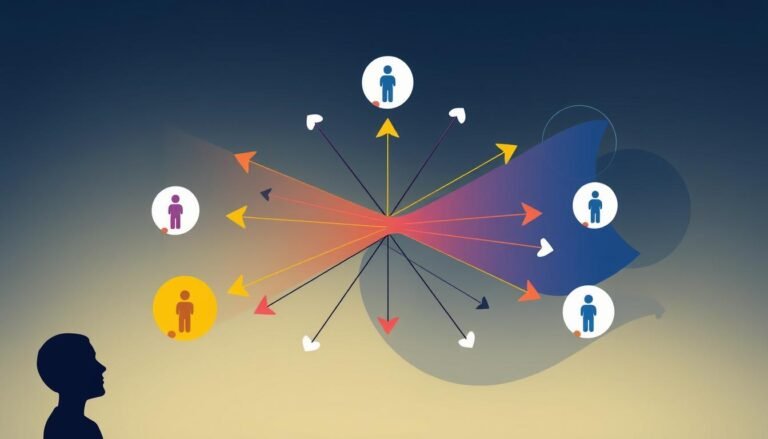Emotional Intelligence in Organizational Context
In today’s fast-paced business world, emotional intelligence (EI) is key. It helps shape how teams work together and drives success. This skill lets people understand and manage their emotions well.
EI, or EQ, is important for leaders to be effective. It helps create a positive work environment. Companies are now using EI to boost team performance and productivity.
Emotional intelligence affects the whole company culture. It influences how employees work together, make decisions, and achieve goals. By focusing on EI, companies can make their work environment better and more efficient.
Key Takeaways
- Emotional intelligence is crucial for effective leadership and team performance
- EI encompasses self-awareness, self-regulation, motivation, empathy, and social skills
- High EQ contributes to better decision-making and conflict resolution in the workplace
- Emotionally intelligent leaders foster happier and more productive employees
- Integrating EI principles can lead to improved organizational culture and success
Understanding the Fundamentals of Emotional Intelligence
Emotional intelligence is key to success in organizations. It’s also known as emotional quotient or EQ. It includes several important parts that help us interact with others and manage our feelings.
Defining Emotional Intelligence
Emotional intelligence lets us recognize, understand, and manage our and others’ emotions. It involves knowing ourselves, being good with people, and handling complex situations well.
Historical Evolution of EI Concepts
The idea of emotional intelligence started in 1920 with Thorndike’s “social intelligence.” It grew with Gardner’s multiple intelligences theory. Now, we understand EQ better than ever.
Core Components of Emotional Intelligence
EQ has parts like self-awareness, self-regulation, motivation, empathy, and social skills. These are the basics of good leadership and help a lot in work performance.
- Self-awareness: Knowing our feelings and how they affect us
- Self-regulation: Controlling our emotions and actions
- Motivation: Pushing ourselves to reach goals
- Empathy: Getting and understanding others’ feelings
- Social skills: Creating and keeping good relationships
Studies say emotional intelligence is 58% of success in all jobs. Companies with emotionally smart leaders do better financially. This shows EQ’s big role in work settings.
“Emotional intelligence is the ability to sense, understand, and effectively apply the power and acumen of emotions as a source of human energy, information, connection, and influence.” – Robert K. Cooper
Emotional Intelligence in Organizational Context
Emotional intelligence is key in the workplace. It shapes how we feel and act in our jobs. A recent study looked at this in educational leadership, showing how emotional smarts work in different schools.
The study followed five principals from a big city school district. Each school had its own culture, social scene, and economy. This mix allowed researchers to see how emotional intelligence works in different places.
The study found that emotional intelligence is very important for leaders. All five principals saw its value and thought they could get better at it. They believed in growing their emotional skills over time.
| Study Aspect | Details |
|---|---|
| Participants | 5 principals from large urban school district |
| Selection Criteria | Unique school dynamics (cultural, social, economic factors) |
| Methodology | Qualitative, multiple case study with open-ended interviews |
| Key Finding | Universal importance of EI skills in leadership roles |
| Noteworthy Observation | Variations in EI skill use across different school contexts |
The study also showed that emotional intelligence skills are used differently in each school. This shows how flexible emotional smarts can be in different work places. It’s a big part of being a good leader and helping the organization succeed.
The Role of EQ in Leadership Effectiveness
Emotional leadership is key to team success and company growth. Studies show EQ’s big role in leading well and managing teams.
Leadership Styles and Emotional Intelligence
Leaders with high EQ adjust their style to fit their team’s needs. They’re great at handling emotions, creating a positive work space. A study found a strong EQ-managerial skill link.
Impact on Team Performance
EQ in leaders boosts team performance. Leaders who understand empathy do 40% better in coaching and decision-making. This leads to better teamwork and results.
Decision-Making and Emotional Competence
Smart leaders balance facts and feelings in their decisions. EQ is the top predictor of work success.
| EQ Impact Area | Percentage |
|---|---|
| Employers valuing EQ over technical skills | 71% |
| Increase in leadership performance with empathy | 40% |
| Employees ranking respectful treatment as top job satisfaction factor | 72% |
These numbers show EQ’s big role in leadership. By improving EQ, leaders can better manage their teams and lead more effectively.
Self-Awareness and Professional Development
Self-awareness is key to emotional intelligence and crucial for growth at work. It helps us understand our feelings, strengths, and weaknesses. This knowledge leads to better decision-making and leadership.
Building emotional self-awareness takes effort and practice. Many people use journaling for deep reflection. Getting feedback from coworkers and bosses helps spot blind spots and areas to improve.
Mindfulness exercises help us recognize and manage emotions better. This practice improves self-regulation and boosts well-being and stress management at work.
“Emotional intelligence is the ability to sense, understand, and effectively apply the power and acumen of emotions as a source of human energy, information, connection, and influence.” – Robert K. Cooper
Leaders with high emotional intelligence do better than others. They connect well with their team and build strong relationships. This creates a positive and productive work environment.
| EI Component | Description | Impact on Professional Growth |
|---|---|---|
| Self-Awareness | Understanding personal emotions and triggers | Improved decision-making and stress management |
| Self-Regulation | Managing emotions and impulses effectively | Enhanced adaptability and conflict resolution |
| Motivation | Drive to achieve goals and persist through challenges | Increased resilience and productivity |
| Empathy | Understanding and responding to others’ emotions | Better teamwork and leadership effectiveness |
| Social Skills | Building and maintaining relationships | Improved communication and collaboration |
Managing Workplace Emotions and Relationships
Emotional intelligence is key in workplace relationships. Leaders with high EQ manage conflicts well and build strong teams. Research shows 90% of top performers have high emotional intelligence, proving its value in work.
Conflict Resolution Strategies
Good conflict management starts with emotional awareness. Leaders who get their and others’ emotions can handle disagreements better. This skill is crucial, as 70% of employees say their manager affects their mental health more than their therapist or doctor.
Building Strong Team Dynamics
Teams with high emotional intelligence communicate and solve problems well. They work together to achieve goals, making the workplace positive. Emotionally intelligent leaders can keep up to 70% of employees for five years or more, keeping the team stable.
Emotional Regulation in Professional Settings
Self-regulation is essential in workplace relationships. Employees with high EQ perform better under pressure and adapt to change well. Mindfulness training lowers stress and boosts resilience, helping manage emotions at work.
| Emotional Intelligence Impact | Percentage |
|---|---|
| Top performers with high EQ | 90% |
| Manager’s influence on employee mental health | 70% |
| Employee retention with emotionally intelligent leaders | 70% |
By focusing on emotional intelligence, organizations can improve their work environment. These efforts benefit not just individual performance but also team dynamics and workplace relationships.
Social Skills and Organizational Success
Social skills are key to success in organizations. They help with emotional competence and effective communication. In today’s fast world, they are vital for strong relationships, teamwork, and better communication.
Studies show that leaders with emotional intelligence do better over time. For example, in a global food company, those with high EI beat earnings goals by 20%.
The World Economic Forum says emotional intelligence is crucial for the future. It’s more important than technical skills for success at all levels. This shows the need to develop social skills along with technical knowledge.
“Emotionally intelligent leadership focuses on the larger business context, leading to better long-term outcomes.” – 2015 Study on Emotional Intelligence
Good leaders know themselves, manage their emotions, and motivate others. They also empathize and have strong social skills. These help them lead diverse teams and build professional connections. Companies that focus on EI training see better team work and results.
| EI Component | Impact on Organizational Success |
|---|---|
| Self-awareness | Improved decision-making |
| Empathy | Enhanced team collaboration |
| Social skills | Stronger client relationships |
| Self-regulation | Better conflict resolution |
Measuring and Developing EI in Organizations
More and more companies see how emotional intelligence (EI) boosts success. They use EI tests and training to grow. This is key for their growth.
Assessment Tools and Methods
EI tests help find where to improve. They use self-reports, ability tests, and feedback from others. These tools show how well someone handles emotions and guide better development.
Training Programs and Interventions
Training in EI aims to improve self-awareness, empathy, and social skills. Such programs make workplaces happier and keep employees longer. Research shows teams with high EI do 20% better in work and happiness.
Benchmarking EI Progress
It’s vital to track EI growth. Companies watch how it affects things like team work and customer happiness. Regular checks help tweak strategies and see how EI efforts pay off.
| EI Impact | Percentage |
|---|---|
| Job Performance | 58% |
| Leadership Effectiveness | 60% |
| Problem-Solving Efficiency | 24% |
| Collaboration Improvement | 30% |
Investing in EI tests and training makes a smarter, more caring team. This leads to better work, leadership, and success overall.
Impact of EI on Organizational Performance
Emotional Intelligence (EI) is key to a company’s success. Studies show EI greatly affects how well employees perform and how well a business does. Companies that focus on EI see big improvements in many areas.
Research shows EI makes employees better at their jobs. People with high EI levels tend to have less burnout and better job results. For example, a study at Case Western Reserve University found EI is more important than IQ or personality for engineers.
EI also helps teams work better together. Companies like Google and SAP use EI in their leadership training. This leads to better teamwork and leadership skills.
| Country | Labor Productivity Growth |
|---|---|
| Malaysia | 2.2% |
| Indonesia | 3.8% |
| Thailand | 4.5% |
EI creates a safe and inclusive work environment. It encourages empathy and open communication. This results in better teamwork, clearer communication, and easier adaptation to new technologies.
“Emotional intelligence was the most significant predictor of effectiveness in engineers working in a research division of a large automotive company, surpassing IQ and personality.” – Richard Boyatzis, Case Western Reserve University
By focusing on EI, companies can reach their full potential. This boosts both employee performance and the company’s overall success.
Cultural Intelligence and Emotional Competence
In today’s global business world, cultural intelligence and emotional competence go together. This combination is crucial for effective communication and leadership across cultures. Leaders who excel in both areas are better at managing diverse teams and creating inclusive workplaces.
Cross-Cultural Communication
Effective cross-cultural communication requires both emotional intelligence and cultural knowledge. Leaders who master this can bridge gaps and foster understanding among team members from different backgrounds. They can pick up on subtle cues and adapt their style to fit various cultural contexts.
Global Leadership Perspectives
Global leaders need a special mix of skills. They must be emotionally aware and culturally savvy to navigate international business relationships. This blend helps them make smart decisions that work across borders and cultures. It’s not just about knowing facts – it’s about feeling the pulse of different cultural environments.
Diversity and Inclusion
Cultural intelligence plays a big role in diversity management. Leaders who combine emotional and cultural smarts create workplaces where everyone feels valued. They’re able to:
- Spot and address biases
- Encourage diverse viewpoints
- Build trust across cultural lines
This approach leads to more innovation and better team performance.
Developing these skills takes time and effort. But the payoff is huge – stronger relationships, better communication, and a more adaptable leadership style that works in our diverse, global business world.
Conclusion
Emotional intelligence has changed the game in business success. Big names like Microsoft and Apple have seen its power. Leaders like Satya Nadella and Tim Cook have shown how EI can change a company’s culture and spark new ideas.
Studies show EI is getting more attention in business. A study found a big increase in EI research since 2008. The US, UK, and Australia are leading in this research, showing EI’s big role in work places.
As we look ahead, leaders will need to grow their EI skills. They must learn to connect with remote teams and make sure everyone feels included. This will help businesses stay strong and succeed in the future.
Source Links
- Emotional intelligence and organizational effectiveness
- What is emotional intelligence and how does it apply to the workplace?
- The Relationship Between Workplace Culture and Emotional Intelligence – Business Leadership Today
- Emotional intelligence, leadership, and work teams: A hybrid literature review
- Improving Emotional Intelligence in the Workplace: Strategies for Success – Diversio
- Emotional Intelligence in the Workplace: Importance & Components [How to Improve]
- ERIC – ED577973 – Emotional Intelligence and Organizational Context in Educational Leadership, ProQuest LLC, 2017
- Emotional Intelligence and Organizational Context in Educational Leadership
- The Role of Emotional Intelligence in Leadership Effectiveness and Organisational Behavior
- Emotional Intelligence in Leadership: Why It’s Important
- The Foundation of Emotional Intelligence for Leaders
- Emotional intelligence and the success of L&D have more in common than you might think – HRD
- Emotional intelligence in the workplace | Brightmine
- Emotional Intelligence in the Workplace, Explained | Built In
- Why Emotional Intelligence Matters More Than Ever for Organizations
- Organizational Emotional Intelligence
- Council Post: Emotional Intelligence For Leadership And Organizational Success
- Its Impact on Team Dynamics and Performance
- The Importance of Emotional Intelligence in the Workplace
- Impact of Emotional Intelligence on Organisational Performance: An Analysis in the Malaysian Public Administration
- Emotional Intelligence: The Skill-Set Amplifying Organizational Success | SIY Global
- Impact of Emotional Intelligence on Employee Performance A Bibliometric Approach
- How Emotional and Cultural Intelligence Shapes Successful Leaders
- The Intersection of Emotional Intelligence and Cultural Competency: A Blueprint for Empathetic Leadership
- About Us – Aurora Training Advantage
- Frontiers | Exploring the Domain of Emotional Intelligence in Organizations: Bibliometrics, Content Analyses, Framework Development, and Research Agenda








